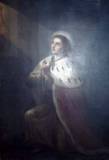Index

|
Saint Casimir Parish
MINISTRY OF PRAISE
JANUARY, 2019
St. Casimir Parish
Almighty God,
grant that with the help of St. Casimir’s intercession
we may serve you in holiness and justice.
|
 |
PLEASE PRAY FOR THE FOLLOWING INTENTIONS
-
That young people,
especially in Latin America, follow the example of Mary and respond to the
call of the Lord to communicate the joy of the Gospel to the world.
(January
Papal intention)
-
That Christ will enlighten the hearts and minds of world leaders so that all
nations will walk by the light of Christ.
-
That we live our baptismal promises with deep authenticity and fervor.
-
That our parish community will grow in its desire for union with Christ,
friendship with each other, and generosity to the poor.
-
That we surrender all selfish ways and follow the Way who is Christ.
-
That God bless
Father Bacevice and the Pastoral and Finance Councils in their efforts to
secure the future of St. Casimir Parish.
-
That all parishioners recognize their responsibility to St. Casimir
Parish’s future through financial support, commitment to parish activities,
sharing ideas, and most importantly prayer.
-
That the New Year will be a time of profound peace and the flowering of
deep and abiding love for all families.
-
That Christ’s love, present in his followers, will bring compassion and
help to those who face hardships of life.
-
That those who pray be validated in their belief of its power
WHAT’S HAPPENING  AT ST. CASIMIR PARISH?
AT ST. CASIMIR PARISH?
-
January 4th
First Friday Adoration of the Blessed Sacrament,
8:00 – 9:00am in Church
-
January 9th
Eucharistic Adoration, 6:00-7:00pm in Church
|
SAINTS FOR
JANUARY
SAINT
ANTHONY
Abbot
(251-356)
January 17th
|
 |
“Seeing the kind of life
he lived, the villagers and all the good men he knew called him
the friend of God, and loved him as both son and brother.”
(Words from the Life of St. Anthony written by St.
Athanasius)
|
|
St. Anthony was born in Egypt and is honored as the founder of
monasticism. In writing of St. Anthony, St. Athanasius describes
Anthony’s life as consecrated to God. St. Augustine in his book (Confessions)
says that St. Anthony’s life was an influence on Augustine’s
conversion and on the vocations of others to the monastic life.
At age 20 Anthony took literally the gospel
passage that said to sell what he had and give it to the poor. For
the next 85 years he lived an austere life, devoting himself to
prayer, and reading the scriptures. He did manual labor to earn his
food, and gave any excess he had to the poor.
He preferred solitude, but he took time to give
guidance and instructions to the many who lived an ascetical life in
the desert. He organized them into monasteries, laying the
foundation for monasticism.
St. Anthony died at the age of l05. He had
renounced the world to serve God in the solitude of the desert and
was called “the friend of God.” Through his intercession, we ask for
the grace to seek the love of God above all things, to keep in
proper perspective the material things we have, and to live in a
spirit of detachment from them through self-denial.
Source: IN HIS LIKENESS,
Rev. Charles E. Yost, |
|
 |
THOUGHTS FROM THE CATECHISM OF THE
CATHOLIC CHURCH |
The Holy Spirit and the Church
#737
The mission of Christ and the Holy Spirit is brought to completion in the
Church, which is the Body of Christ and the Temple of the Holy Spirit. This
joint mission henceforth brings Christ’s faithful to share in his communion with
the Father in the Holy Spirit. The Spirit prepares men and goes out to them with
his grace, in order to draw them to Christ. The Spirit manifests the risen Lord
to them, recalls his word to them and opens their minds to the understanding of
his Death and Resurrection. He makes present the mystery of Christ,
supremely in the Eucharist, in order to reconcile them, to bring them into
communion with God that they may “bear much fruit.”
|
 |
REFLECTION |
 |
EPIPHANY
The solemnity
of the Epiphany of the Lord is considered to be one of the
oldest feasts of Christianity. It was celebrated as far back as
the second century in the Eastern Church. In the East, the feast
meant the adoration of the Magi, the baptism of Christ, and the
miracle at Cana. At each of these events, there was some
manifestation of Christ’s divinity. This is what Epiphany means,
“manifestation, revelation.”
In the West,
the feast came to mean the visit of the Magi. It refers to God
being made known in the person of Jesus to the Magi who
represent all nations. The Fathers of the Church interpreted the
gifts of the Magi to be symbolic of the royalty (gold), divinity
(incense), and Passion (myrrh) of Christ.
The readings
for the feast emphasize the universality of God’s power, love,
and presence to all people. Jesus is the Light of the
Nations—all nations. Jesus has come for all because there are no
limits to His love, and He will bring all people to His Father.
The feast
reminds us that we are responsible for sharing the Church’s
gifts, especially the gift of Christ to the world. Our outlook
is to be ecumenical. We are to reach out in prayer, sacrifice,
and active charity with the vision that God’s kingdom is for
everyone.
Source: SAINTS AND
FEAST DAYS, Loyola University Press, p.68.

|


 AT ST. CASIMIR PARISH?
AT ST. CASIMIR PARISH?

